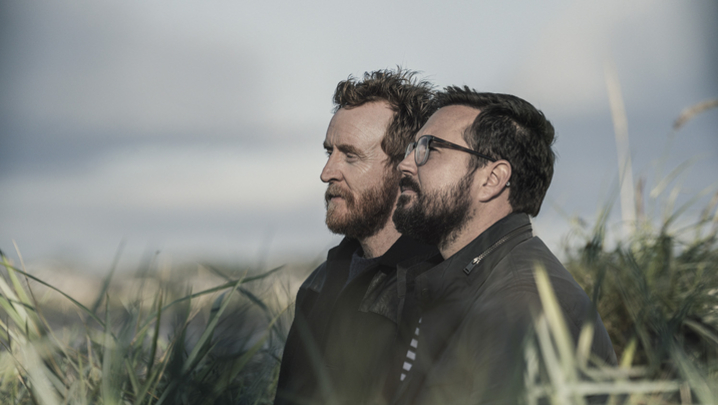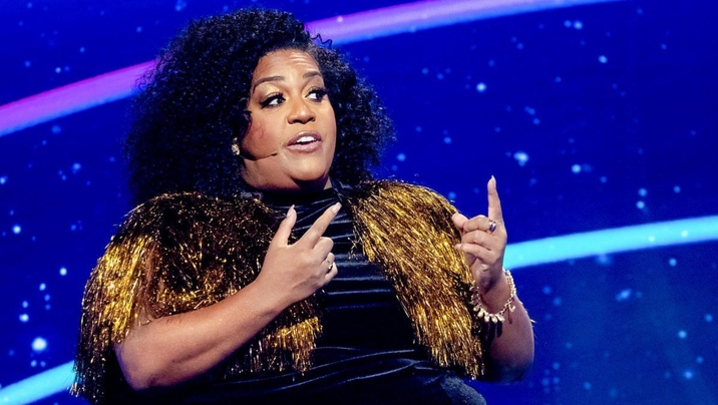Shilpa Ganatra examines why BBC Three sketch show Famalam, a huge hit on social media, is making big waves with its third series
When Famalam came to our screens in 2018, British television was ready and waiting for a high-profile comedic exploration of the contemporary black British experience. It tapped the same vein as Michaela Coel’s Chewing Gum and the 1990s ensemble show The Real McCoy – and another hit sketch show was long overdue.
It was squarely on target on both counts. In the two years since then, the show has earned RTS and Bafta recognition for its driving force, Akemnji Ndifornyen (known as AK), and actor/writers Samson Kayo and Gbemisola Ikumelo. The show’s clips are among the BBC’s most-viewed social content.
“A large part of [it] was to appeal to black folk, and for us to have agency over our stories,” says AK of its crossover success. “Because it has served us first and has now gone broader, we’re thrilled.”
With the cast completed by Vivienne Acheampong, John Macmillan, Tom Moutchi and Danielle Vitalis, the troupe continues the winning formula in the third series. AK believes it to be “the strongest yet”. Certainly, it’s found its stride: alongside familiar characters, such as the imposing gaggle of aunties and the Nigerian philanthropist Prince Alyusi, its 22-minute episodes are crammed with absurd situations pushed to their extreme and smart observations about life today.
The opening gambit is a Narcos-style skit in which two avocado cartels meet to do a dangerous deal; “You know we are going to have to test it,” says one, chopping up a line of avocado to smear on toast and taking a rush-inducing bite.
The new series sees a change of the core cast, with Roxy Sternberg stepping out and Vitalis stepping in.
“All the cast are becoming harder to nail down, but Roxy had a massive job offer in the US and we couldn’t make it work,” explains Ben Caudell, an executive producer of all three series. “So we’ve brought in Danielle, and she’s brilliant. The change has widened up our comic angles and it’s brought a freshness to it. It excites the writers and keeps us on our toes.”
While the dominating type of comedy is irreverence, the smarts are in the density of ideas, the multilayered observations and unexpected left turns. “Life provided a wealth of inspiration to lampoon and satire,” says AK.
It helps that, with a largely black British cast and crew, otherwise--sensitive topics that have bubbled to the foreground this past year are handled from a place of experience, rather than judgement.
A case in point is a musical number, Interracial Couples Selling Stuff, performed by AK as if channelling Errol Brown from Hot Chocolate. The everyday lyrics against the sexiness of the song is funny in itself, but poking fun at ad companies’ formulaic output notches up the comedy – even when the point is the same as that made by social media trolls. For AK, it’s a case of “classic message and messenger”, he says. “Two people can say the same thing, but, because one person has the licence to say it, it means different things.”
That is a large part of its unique position in 2020’s TV landscape, explains Shane Allen, controller of BBC comedy commissioning: “People in mainstream white culture walk on eggshells in certain areas, working out how they can keep pushing the boundaries, but it’s more likely that the boundaries are going to be pushed by people who aren’t the mainstream voice.
“If you have people from those backgrounds who own the joke, then that’s what the line is. Culturally, it’s really important that comedy still has a bite and is able to ruffle feathers. It keeps comedy relevant in an age when people are saying, ‘It’s all gone PC and they’re trying to take away our comedy’. Actually, we’re trying hard for that not to be the case.”
Crucially, in this politically weighty age, the show isn’t only about the black experience. Jokes are made about the affront involved in leaving a WhatsApp group and people who thwart conversations when there’s a spoiler involved – in other words, ribbing every aspect of contemporary life.
“If something pops up as part of the zeitgeist, it’s like a Hungry Hippo: you have to knock it down,” says AK. “I apply the Family Guy model of laughs: that nothing and no one is sacrosanct. So, while my name is one of the blackest, most African names you can ever find and, when I cross my mother’s threshold, I’m in Cameroon, the reality is that there are some aspects of life that we all encounter. Love, relationships, aliens – we’ll cover it all.”
The social media figures indicate that this approach has proved popular: “Turf wars” has been viewed more than 30 million times, and “There is no white Jesus” stands at 27.5 million views, making these Famalam sketches among the BBC’s most successful social media content. Which, as a blunt measure of success, matters.
“The overnights are not as relevant as they were even two or three years ago – now you’re looking for social media impact, cultural impact, and a little bit of industry impact,” says Allen. “Social media figures are one factor in a wide array of how you judge a show, but, because the BBC is trying to reach the young, underserved audience, it’s an important one – this audience isn’t lining up to watch a specific show in a specific time slot on a specific channel any more. There isn’t that brand loyalty.”
It helps greatly, of course, that short-form content viewed on social media fulfils the BBC’s remit as much as traditional viewing. The format also aids its remit of seeking out emerging talent, a specific forte of sketch shows. Allen reels off TV royalty such as Lenny Henry, Meera Syal, and Rowan Atkinson, whose talent was nurtured in sketch shows Three of a Kind, The Real McCoy and Not the Nine O’Clock News, respectively.
“Sketch shows encourage mastering of the short form: creating a character, finding a concept and playing it out in two to three minutes,” he says. “I think that’s a great training ground for writers to then go on and write longer-form pieces or rounded sitcoms. Father Ted creators Graham Linehan and Arthur Mathews wrote for Alas Smith & Jones and, in the US, Tina Fey went from Saturday Night Live to 30 Rock.”
Famalam is already proving successful in developing talent, with Sternberg’s move to the US, and AK’s Bafta Television Craft Award for Breakthrough Talent suggesting that “he’s going to be a lot of people’s boss soon”, according to Allen. The BBC comedy chief also commissioned Brain in Gear, Ikumelo’s comedy short, for a full sitcom to air on BBC Two.
The better news is that, even if the cast and crew outgrow the show, the Famalam series could keep running regardless. “It’s not like writing a soap opera or a new series of Line of Duty, where you have to keep thinking of new stories,” says Caudell. “Sketches are often about life and there’s always going to be new aspects coming through, and new talent coming through, too.”
AK agrees: “In a show where we’ve set a template for regeneration, anything’s possible. And this country has no shortage of black talent, because that’s what this show is about. This can be a great platform for the next generation of people. I can see this show continuing and having a long-lasting legacy.”






